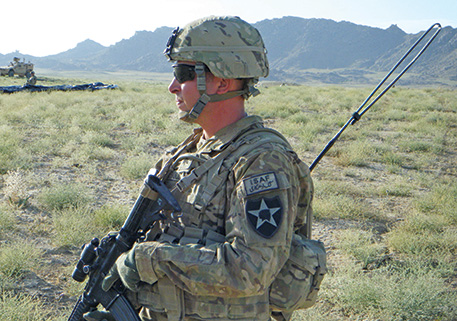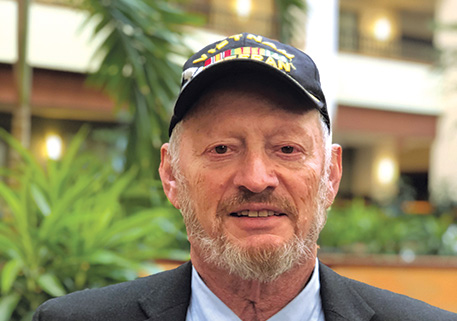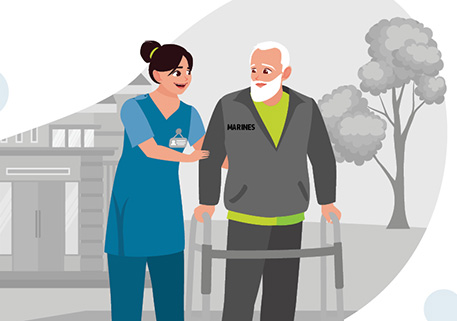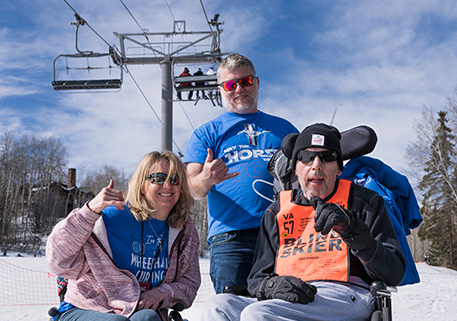Initiative focuses on veteran perspective, builds partnerships that change lives
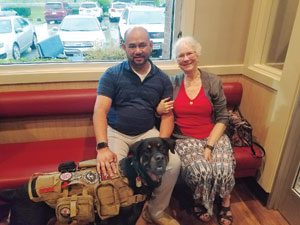
In less than a year, combat veteran Tawan Throngkumpola went from serving in the U.S. Navy to living out of his truck in a Wal-Mart parking lot in Austin, Texas, with his service dog, Cali.
The former corpsman left the military in 2015 with an honorable discharge after serving three tours in Iraq and another in Afghanistan, attached to the 2nd Marine Division. He learned later the condition of his discharge, as reflected on his DD-214, had inexplicably been changed to other than honorable. His health care was initially covered for six months following his transition out of active duty, but by March 2016, he had to request humanitarian medical care from the VA for medication to treat post-traumatic stress and a traumatic brain injury (TBI). The discharge hindered the review of his VA claim, and that is when he found himself sleeping in a vehicle.
DAV life member Michelle Clark heard about Throngkumpola’s situation and jumped into action. The retired Army sergeant major, then serving as the commander of DAV Chapter 219 in Austin, rallied other members, and they came together to support the Navy veteran in his time of need.
“DAV took care of me,” explained Throngkumpola, who joined as a life member when he was back on his feet. “Michelle also took me to the VA, through every department, to get me access to any assistance I was eligible for. She made me feel like I was not alone.”
For Clark, giving back was a given. “Helping veterans is what DAV stands for, and that’s why I am a member,” she said.
After an exhaustive search for long-term veteran lodging, Clark was told by the Austin VA Medical Center that none of their local transitional housing partners allowed animals—including service dogs.
“That was unacceptable to me,” said Clark, who deployed to Afghanistan for a year in 2008. “There are so many veterans with service dogs now. I could not believe it.”
Clark called the VA headquarters in Washington, D.C., and her complaint made its way to the office of VA Acting Deputy District Veteran Experience Officer Chris Hluchyj.
The Veteran Experience
The MyVA transformation—initiated in 2014—charged the Department of Veterans Affairs with achieving customer service excellence; the Office of Veteran Experience (VE) was created last year to ensure that happens.
The VE reports directly to the secretary of Veterans Affairs, but works closely with and counsels the Veterans Health Administration, Veterans Benefits Administration and National Cemetery Administration. VE is headquartered in Washington, D.C., and has five district teams that work with local VA facilities, as well as government and community partners like DAV to implement solutions that best serve veterans.
“We’re effectively the connective tissue between headquarters and the field,” said Hluchyj, a Marine Corps veteran.
VE works with both veterans and employees, collecting feedback in order to improve customer service with a bird’s eye view of services and programs. The office also leverages and incorporates industry best practices from leading customer service organizations.
In January, DAV National Service Director Jim Marszalek was invited to participate in a MyVA Advisory Committee meeting and share his experiences as a customer who uses VA health care services.
Marszalek joined Throngkumpola and four other veterans in addressing the committee, which consists of VA leaders, including the secretary, as well as public and private partners.
“The panel provided honest feedback to VA. We are all veterans, but our experiences were all different; some were good and some were bad,” said Marszalek. “Positive or negative, the committee wanted our input. The comments gave the VA firsthand insight into what is working—and what isn’t—for veterans.”
“In the past, veterans and community leaders were raising issues but felt like the VA was not listening to them,” explained Hluchyj. “With the creation of the Office of Veterans Experience, VA has the opportunity to take these stakeholder issues to the highest level.”
The VA has a priority goal of reaching 90-percent stakeholder agreement with the statement, “I trust VA to fulfill our country’s commitment to veterans” by Sept. 30, 2017.
“We want to provide the best customer service within the federal government,” said Hluchyj. “Effectiveness, ease and emotion along with our services. It’s what our veterans deserve.”
Hluchyj stressed that strong relationships with veterans service organizations are essential for improving VA customer service.
“They amplify the voice of veterans, and that helps us continue to improve customer service at VA,” said Hluchyj. “Additionally, benefits and services can be extremely difficult to navigate, and we rely on organizations like DAV to help veterans with the process and also ensure they are getting the services they need from VA.
“Another area where the support of outside organizations really makes a difference is where there are gaps in benefits and services based on a veteran’s eligibility. These organizations supplement support to the veterans for us,” he added.
These partnerships were critical in helping Throngkumpola find his way out of homelessness.
Overcoming obstacles
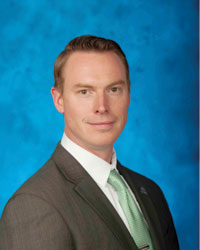

—Chris Hluchyj, VA Acting Deputy District Veteran Experience Officer
“I first heard about Tawan’s situation after the Office of Veterans Experience had really just gotten off the ground,” said Hluchyj. “I knew it was critical to provide a positive, favorable customer experience from the beginning and show that VA is veteran-centric. We can’t stop at fulfilling one need for a veteran, but look at all of the issues and challenges they are facing and see what else we can do.”
Hluchyj worked within the VA and with outside organizations to ensure Throngkumpola had basic necessities.
“Chris never left my side. He made sure that I had food, that Cali had dog food and that we both had a roof over our head,” said Throngkumpola.
Throngkumpola learned that he and Cali were eligible for a veterans program in San Antonio that provides residential rehabilitation and case management services, life skills training and counseling. The program specializes in assisting veterans diagnosed with PTSD and TBI.
Throngkumpola moved from Austin and enrolled in the VA-sponsored program and housing as he continued to work to fix his military discharge and obtain his VA rating, with support from Hluchyj along the way.
“Chris was instrumental in navigating my way through the VA bureaucracy,” said Throngkumpola. “Things were starting to look up.”
Then a staff member at the Audie L. Murphy Memorial VA Hospital informed him that he was not eligible for housing assistance because of his discharge. Throngkumpola tried to explain his unique situation and the efforts underway to change the discharge, but the VA staffer contacted the transitional housing program and told them the veteran was not eligible for enrollment. Throngkumpola was back to living in a parking lot—but not for long.
Throngkumpola called Hluchyj, and the VE team jumped into action, reversing the decision from the local VA office and getting Throngkumpola out of his truck and back into housing.
“When we had doors shut because of what his DD-214 said at the time, we couldn’t let that prevent us from helping,” said Hluchyj. “We can’t—and won’t—forget about our veterans. It’s following up, reassessing and re-evaluating the way forward.”
Hluchyj’s determination to help Throngkumpola foreshadowed a historic announcement regarding urgent mental health care from VA Secretary Dr. David J. Shulkin during testimony to the House Committee on Veterans’ Affairs in March.
“We are going to start providing mental health care for those that are other than honorably discharged,” said Shulkin at the hearing. “I don’t think it can wait, and so we are going to start doing that now.”
With mentorship from Hluchyj, Throngkumpola decided to embark on a new journey that his experience had inspired him to pursue: college.
“My calling is to help other veterans,” said Throngkumpola, who is now a student at the University of North Texas following confirmation that he was, in fact, eligible for the Post-9/11 GI Bill.
At the end of that semester, he received more good news: He was rated appropriately and now had access to the benefits and services he fought for, as well as back pay that is allowing him to focus on being a student—not how he will pay for his next meal.
“This is a happy-ending story,” said Throngkumpola. “Cali and I have a roof over our head, we have food, and most importantly, we feel safe. It took a while to get where we’re at, and we’re still fighting. But we are in a better place than we were a year ago, and we didn’t get here alone.”
Hluchyj stressed that the various groups working together is what set Throngkumpola up for success. “When it comes to serving veterans, it takes not only the VA, but national and local organizations coming together with veterans at the forefront.”


